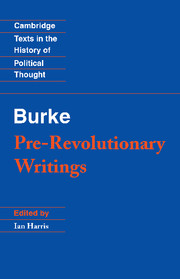Book contents
- Frontmatter
- Contents
- Preface
- Acknowledgements
- Abbreviations
- Chronological table
- Introduction
- A note on the texts
- Biographica
- Bibliography
- ‘Extempore Commonplace on The Sermon of Our Saviour on the Mount’
- A Vindication of Natural Society
- A Philosophical Enquiry into the Origin of our Ideas of the Sublime and Beautiful
- ‘Religion’
- Tracts on the Popery Laws
- Thoughts on the Cause of the Present Discontents
- Conciliation with America
- ‘Almas Ali Khan’
- ‘Speech on the Army Estimates’
- Index of persons
- Index of subjects and places
- Cambridge Texts in the History of Political Thought
‘Speech on the Army Estimates’
Published online by Cambridge University Press: 05 June 2012
- Frontmatter
- Contents
- Preface
- Acknowledgements
- Abbreviations
- Chronological table
- Introduction
- A note on the texts
- Biographica
- Bibliography
- ‘Extempore Commonplace on The Sermon of Our Saviour on the Mount’
- A Vindication of Natural Society
- A Philosophical Enquiry into the Origin of our Ideas of the Sublime and Beautiful
- ‘Religion’
- Tracts on the Popery Laws
- Thoughts on the Cause of the Present Discontents
- Conciliation with America
- ‘Almas Ali Khan’
- ‘Speech on the Army Estimates’
- Index of persons
- Index of subjects and places
- Cambridge Texts in the History of Political Thought
Summary
Introduction
Richard Burke, who followed his father's career closely, suggested in 1790 that Edmund's political opinions never arose suddenly. ‘There is one thing … which I know from an intimate experience of many Years’, he wrote:
It is, that my father's opinions are never hastily adopted; and that even those ideas, which have often appeared to me only the effect of momentary heat or casual impression, I have afterwards found, beyond a possibility of doubt, to be either the result of the systematick meditation perhaps of Years, or else if adopted on the spur of the occasion, yet formed upon the conclusions of long and philosophical experience.
Nowhere is this reflection more fully realized than in Burke's view of the French Revolution.
When the summer of 1789 signalled the beginning of the French Revolution, Burke was about sixty years of age. His thought had developed continuously. Its basic stance had been established at an early stage, as is usually the case if thought is to develop and mature. The assumption that the divine order was manifested through inequality is found in writings produced before Burke was thirty. He had praised revelation and considered the benefits of a propertied order when an undergraduate. He had explored the way in which nature tended to form societies, elevate some men above others and encourage improvement in his Philosophical Enquiry of 1757 and shown the benefits in liberty and civilization accruing from one such society, in the Abridgement he wrote soon afterwards.
- Type
- Chapter
- Information
- Pre-Revolutionary Writings , pp. 298 - 320Publisher: Cambridge University PressPrint publication year: 1993



